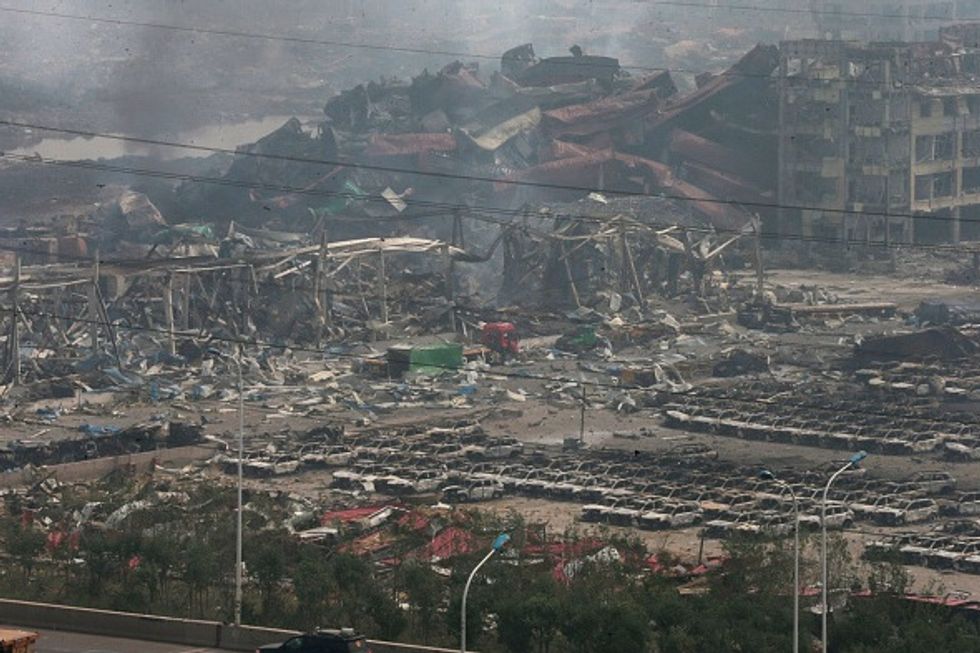
Image shows blast site three days after warehouse explosion on August 15, 2015, in Tianjin, China. (Image source: ChinaFotoPress/ChinaFotoPress via Getty Images)

TIANJIN, China (AP) — Authorities pulled more bodies from a massive blast site in the Chinese port of Tianjin, pushing the death toll to 112 Sunday as teams scrambled to clear dangerous chemical contamination.
Hundreds of people were injured and 85 firefighters and 10 others are missing since a fire and rapid succession of blasts late Wednesday hit a warehouse for hazardous chemicals in a mostly industrial area of Tianjin, 75 miles east of Beijing.

New small explosions continued to rock the locked-down disaster zone over the weekend.
Angry relatives of the missing firefighters stormed a government news conference Saturday to demand any information on their loved ones. The death toll includes at least 21 firefighters — making the disaster the deadliest for Chinese firefighters in more than six decades.
Two state-run Chinese news outlets, The Paper and the Southern Metropolis, reported that the warehouse was storing 700 tons of sodium cyanide — 70 times more than it should have been holding at one time — and that authorities were rushing to clean it up.
Sodium cyanide is a toxic chemical that can form a flammable gas upon contact with water.
Authorities also detected the highly toxic hydrogen cyanide in the air slightly above safety levels at two locations, The Paper cited Tianjin environmental official Wen Wurui as saying. But the contamination was no longer detected later Saturday, the report said.
The disaster has raised questions about whether dangerous chemicals were being stored too close to residential compounds, and if poor decisions unnecessarily sent firefighters into the harm's way. The massive explosions Wednesday happened about 40 minutes after reports of a fire at the warehouse and after an initial wave of firefighters arrived and, reportedly, doused some of the area with water.
Rescuers pulled out a survivor from a shipping container on Saturday, state media reported. Fooage showed the 56-year-old man being carried out on a sketcher by a group of soldiers wearing gas masks. He remained in critical condition Sunday, local media reported.
Authorities were keeping residents, journalists and other people not involved in the disaster response outside a 1.8-mile radius around the site of the explosions in what media reports said was an operation to clean up the sodium cyanide.
Heavy smoke from a fire engulfing several cars rose as high as 10 yards, accompanied by at least five explosions.
Police and the military set up checkpoints on roads leading to the blast sites, and helicopters hovered in the overcast sky. The air had a metallic chemical smell, and there was fear that rains mixed the chemicals could set off more explosions.
Meanwhile, family members of missing firefighters barged in at the news conference complaining about lack of information.
"[The authorities] didn't notify us at all," said Liu Huan, whose son Liu Chuntao has been missing since late Wednesday. "Our son is a firefighter, and there was a team of firefighters who lost contact. We couldn't contact him."
Liu Longwang said she had not heard a word on her son Liu Ziqiao, also a firefighter. "We are extremely worried," she said. "He just turned 18."
State media reported that the casualties of the first three squads of firefighters to respond and of a neighborhood police station have not yet been fully determined.
Another firefighter, 19-year-old Zhou Ti, was found Friday morning and taken to a hospital.
Li Yonghan, a doctor at Teda Hospital, called Zhou's survival "miraculous" and said Zhou escaped death mainly because he was covered by his fallen comrades. Zhou had massive injuries, including burns and leg cuts.
From his hospital bed, Zhou told state broadcaster CCTV that the fire was spreading out of control. "I was knocked onto the ground at the first blast," recalled Zhou, his eyes swollen and closed. "I covered my head and don't know what happened after that."
Local officials have been hard-pressed to explain why authorities permitted hazardous goods warehouses so close to residential complexes and critical infrastructure, clearly in violation of the Chinese rule that hazmat storage should be 1,000 yards away from homes and public structures.
Associated Press videojournalist Peng Peng in Tianjin and writers Didi Tang, Ian Mader, and Christopher Bodeen in Beijing contributed to this report.
—
Follow Dave Urbanski (@DaveVUrbanski) on Twitter